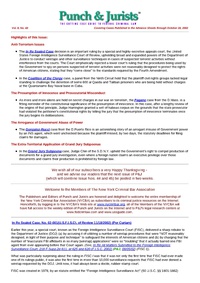A coalition group lacked next-friend and third party standing to bring a habeas petition on behalf of persons captured in Afghanistan and detained by the U.S. and the court lacked jurisdiction to decide whether it or any court could hear habeas claims.
It is becoming increasingly apparent that, …
Here the Court granted a writ of habeas corpus on the grounds that the state prosecutor had violated the petitioner’s constitutional rights by telling the jury that the presumption of innocence terminates once the jury begins its deliberations.
At a time when alleged terrorists are being seized right …
A district court may properly exclude a plea agreement offered for the purpose of establishing the government's belief in a person's innocence, under Fed.R.Evid. 403, and such exclusion did not violate the right to confrontation of witnesses.
Apprendi does not apply retroactively to initial 28 U.S.C. § 2255 motions, as it is not a watershed rule of criminal procedure, and Apprendi does not create jurisdictional problems for district courts to hear cases where the drug quantity is not specified in the indictment.
Here the Court affirmed the grant of injunctive relief against prison officials who sought to bar legal correspondence between inmates, stating that the officials failed to show the ban served a legitimate penological purpose.
In this case, prior to July 1, 2001, prison officials permitted inmates to provide …
Here a state inmate brought a civil rights suit against defendant prison officials, claiming that the prison's exclusion of him from participating in Jewish services and holidays violated his constitutional rights. The jury awarded plaintiff nominal and punitive damages, and the District Court for the Southern District of Iowa …
Here the Court held that it had no jurisdiction under 8 U.S.C. § 1252(a)(2)(C) to review a removal order where petitioner committed two crimes of moral turpitude and the removal did not raise any substantial issues of constitutional law.
The petitioner alien in this case sought judicial review …
In this case, the defendant, a citizen of Brazil, was charged with bribery, and conspiracy to commit bribery, of an immigration official. The defendant retained a criminal defense attorney who met with her initially for approximately fifteen minutes. (Id. at 182-83). The defendant did not hear from her attorney …
Here the Court held that the IIRIRA does not deprive a Circuit court of jurisdiction where the temporary resident had an “aggravated felony” conviction that did not qualify as an “aggravated felony” under pre-IIRIRA law.
In this case the petitioner/alien filed a petition for review of respondent Immigration …
In this case, the Court held that a defendant with an extensive criminal history, and who admitted guilt during a plea, is not eligible for a downward departure, under Section 5K2.13(1), (2) and (3), even if defendant establishes he suffers from diminished capacity. However, the case is also noted …
The defendant in this case appealed the denial of his request for authorization to obtain a psychiatric evaluation for purposes of supporting his downward departure motion based on diminished capacity, pursuant to U.S.S.G. § 5K2.13. The Court observed that there was no dispute that Cravens was financially unable to …
Petitioner sought a writ of habeas corpus under 28 U.S.C. § 2254, asserting that his conviction was illegal. The District Court for the Eastern District of Texas granted the petition and ordered the Texas courts to resentence petitioner within 90 days or his conviction would be reversed. Respondent government …
Here the Court presented a lengthy dissertation on the "law of the case" doctrine - which posits that ordinarily "an issue of fact or law decided on appeal may not be reexamined either by the district court on remand or by the appellate court on subsequent appeal." (Id., at …
Here the secret Foreign Intelligence Surveillance Court of Review reversed a lower court decision and held that the Government has broad powers to conduct surveillance of suspected terrorists, stating the procedures "come close" to the standards required.
Earlier this year, a special court, known as the Foreign Intelligence …
Here the Court held that a Grand Jury had the right to compel production of documents for an investigation, even where a foreign nation claimed an executive privilege over those documents and claimed their production was prohibited by foreign law.
In this case, a Federal grand jury, which …
Here, despite serious instances of unmitigated abuse of power by an INS agent, the Court dismissed the plaintiff's tort claims and Bivens actions because she had missed, by two days, the filing deadlines for such actions.
The plaintiff in this case, Rosaura Gonzalez-Rucci (Gonzalez), is an immigration lawyer …
In this case, a jury convicted the defendant for carjacking and conspiracy to commit carjacking. After his sentencing, the defendant appealed and the Fifth Circuit vacated the carjacking sentence and remanded for resentencing. The district court resentenced defendant to 15 years for simple carjacking under 18 U.S.C. § 2119(1) …
